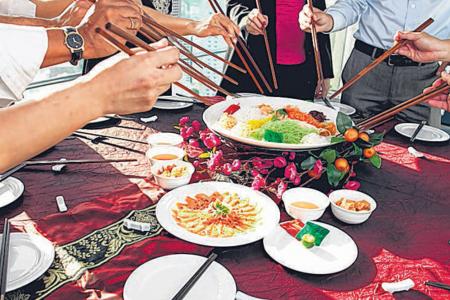Taking out the 'raw' in raw fish dish
Some eateries are changing yusheng ingredients in wake of NEA's ban
Fret not, this year's tossing to abundant prosperity can still take place - with some minor adjustments to the yusheng dish.
In response to concerns over raw fish served here, restaurants and hotels are offering alternatives.
Mr Tan Yong Kang, 44, director and chef of Restaurant Home, says he will replace raw salmon with smoked salmon, lobster meat or abalone slices.
"Some of our guests have asked if our salmon is fresh, and whether it's safe to consume. So we decided to just come up with other alternatives," he says.
"We offer smoked salmon because most of our customers still want to keep the tradition of using fish. They also prefer the texture of fish as compared to abalone and lobster meat."
It is unlike last year, when Restaurant Home offered raw salmon for its yusheng platter.
BANNED
The restaurant's change in menu comes a month after the National Environment Agency (NEA) banned the sale of raw freshwater fish dishes at all food establishments.
The ban followed an outbreak of Group B Streptococcus (GBS) infections linked to the dishes. But saltwater fish was not linked to the outbreak.
Last year, about 150 people were infected by the GBS bacteria after eating raw freshwater fish. It brought the total number of GBS infections for the year to 355, compared with about 150 cases annually from 2011 to 2014.
Mr Tan says: "Once something like this happens in Singapore, we've to watch out and look at the situation to make changes."
The flip side? On average, yusheng with abalone or lobster meat would cost about 30 per cent more than salmon sashimi or smoked salmon yusheng.
Other alternatives include the citrus-cured Hokkaido scallop and crispy conpoy lo hei at Orchard Hotel's Hua Ting Restaurant, yusheng platters with abalone, Hokkaido scallops and gold and silver flakes (Hai Tien Lo) and wafu yusheng (Keyaki) from Pan Pacific Singapore.
Mr Tonny Chan, 53, chef of Tonny Restaurant, has also replaced the raw salmon with smoked salmon, top shell, abalone and even Spanish ham.
Mr Chan says in Mandarin: "It's better not to take the risk.
"Even though saltwater fish, like salmon, is not involved in the recent outbreak, once someone falls ill after eating any raw fish, people will immediately ask, 'Which restaurant?' and then link it to the recent outbreak.
"Once this happens, the restaurant may have to close for three days and if these three days fall on Chinese New Year, it'll be a blow to the restaurant."
But not everyone is making changes.
Mr Pung Lu Tin, 55, director of Tim Palace restaurant, says only 5 per cent of his customers expressed concerns regarding raw fish.
"I've not really come across people who opt to change the raw salmon to something else," he says.
"Besides yusheng, many hotels still serve sashimi in buffets and many people are still eating them.
"But when customers get concerned, we understand and it's our duty to explain to them that the salmon we use is hygienic and safe to consume raw."
Get The New Paper on your phone with the free TNP app. Download from the Apple App Store or Google Play Store now


